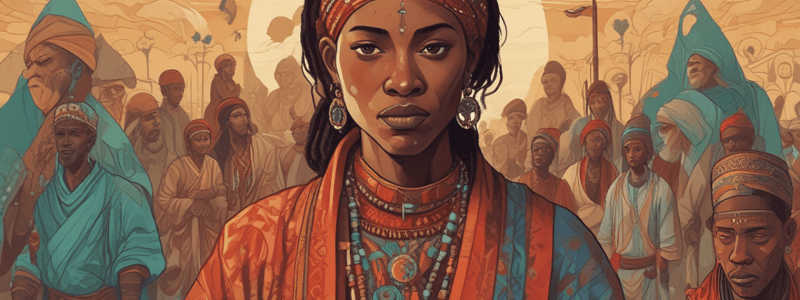Podcast
Questions and Answers
What is the relationship between trauma and memory?
What is the relationship between trauma and memory?
- Memory is the emotional and/or physical experience, and trauma is the content, or narrative. (correct)
- Trauma and memory are mutually exclusive and do not interact with each other.
- Trauma is an involuntary action, whereas memory is a voluntary action.
- Trauma is the content, or narrative, and memory is the emotional and/or physical experience.
What happens to the effects of conflict after the violence has ended?
What happens to the effects of conflict after the violence has ended?
- They are reversed, and the effects are erased.
- They disappear immediately.
- They linger for a short period of time before disappearing.
- They continue to manifest long after the event has passed. (correct)
What is the nature of trauma?
What is the nature of trauma?
- A voluntary action that can be controlled.
- An involuntary action that cannot be controlled. (correct)
- A physical response that is separate from emotions.
- An emotional response that is separate from physical experiences.
What is the concept that describes the lingering effects of conflict?
What is the concept that describes the lingering effects of conflict?
What is the relationship between conflict and its underlying factors?
What is the relationship between conflict and its underlying factors?
How does the state often intervene in the memory of conflict?
How does the state often intervene in the memory of conflict?
What is the significance of the Holocaust in the Israeli state?
What is the significance of the Holocaust in the Israeli state?
Why do states sometimes suppress or downplay memories of conflict?
Why do states sometimes suppress or downplay memories of conflict?
What is the role of collective memory in the psyche of a group?
What is the role of collective memory in the psyche of a group?
How do non-state collectives tend to operate in terms of memory?
How do non-state collectives tend to operate in terms of memory?
What is the relationship between individual memory and collective memory?
What is the relationship between individual memory and collective memory?
Why do individuals often seek to forget memories of conflict?
Why do individuals often seek to forget memories of conflict?
What happens to the memories of conflict when they are passed between individuals?
What happens to the memories of conflict when they are passed between individuals?
What is the significance of the Armenian Genocide in the context of collective memory?
What is the significance of the Armenian Genocide in the context of collective memory?
What is the role of state textbooks in shaping memory?
What is the role of state textbooks in shaping memory?
What is the primary reason behind the appropriation of memory for a purpose?
What is the primary reason behind the appropriation of memory for a purpose?
What is the term used to describe the phenomenon of individuals experiencing traumatic effects even though they were not directly involved in the conflict?
What is the term used to describe the phenomenon of individuals experiencing traumatic effects even though they were not directly involved in the conflict?
What is the name of the commission established in South Africa to help victims of apartheid achieve closure and healing?
What is the name of the commission established in South Africa to help victims of apartheid achieve closure and healing?
What is the term used to describe the tendency of individuals or groups to deflect blame for their actions onto external factors or persons?
What is the term used to describe the tendency of individuals or groups to deflect blame for their actions onto external factors or persons?
What is the name of the Nobel Peace Prize winner who emphasized the importance of remembering the past in his acceptance speech?
What is the name of the Nobel Peace Prize winner who emphasized the importance of remembering the past in his acceptance speech?
What is the primary argument made by those who support the idea of remembering the past?
What is the primary argument made by those who support the idea of remembering the past?
What is the term used to describe the feeling of guilt experienced by individuals who have survived a traumatic event while others did not?
What is the term used to describe the feeling of guilt experienced by individuals who have survived a traumatic event while others did not?
What is the term used to describe the phenomenon of individuals experiencing traumatic effects through visual means, such as seeing refugees in a decrepit state?
What is the term used to describe the phenomenon of individuals experiencing traumatic effects through visual means, such as seeing refugees in a decrepit state?
What is the term used to describe the process of rationalizing violence suffered by explaining it either materially or philosophically?
What is the term used to describe the process of rationalizing violence suffered by explaining it either materially or philosophically?
What is the primary purpose of transmitting memories of traumatic events across generations?
What is the primary purpose of transmitting memories of traumatic events across generations?
What is a key factor that influences the nature and condition of memory/trauma?
What is a key factor that influences the nature and condition of memory/trauma?
Why is memory of conflict rarely evoked without a purpose?
Why is memory of conflict rarely evoked without a purpose?
What is a characteristic of the state-approach to memory?
What is a characteristic of the state-approach to memory?
Why can memory of conflict be manifestly different?
Why can memory of conflict be manifestly different?
What is an additional variable to consider when analyzing the memory of conflict?
What is an additional variable to consider when analyzing the memory of conflict?
What is the significance of memory in understanding the psychological/behavioural effects of conflict?
What is the significance of memory in understanding the psychological/behavioural effects of conflict?
What is the outcome of not having stories heard by sympathetic ears?
What is the outcome of not having stories heard by sympathetic ears?
What can be an observable manifestation of post-conflict trauma at the policy level?
What can be an observable manifestation of post-conflict trauma at the policy level?
What is a potential consequence of remembering past conflicts?
What is a potential consequence of remembering past conflicts?
What is a private sphere manifestation of post-conflict trauma?
What is a private sphere manifestation of post-conflict trauma?
What is a potential long-term consequence of unresolved conflict?
What is a potential long-term consequence of unresolved conflict?
What is a way to counter against the homogenisation of narrative?
What is a way to counter against the homogenisation of narrative?
Flashcards are hidden until you start studying




